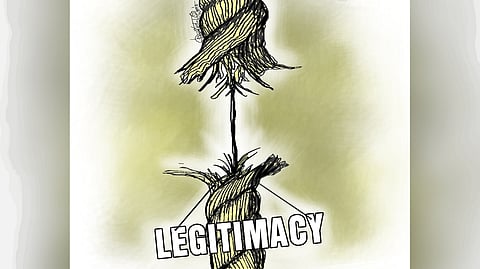
- NEWS
- the EDIT
- COMMENTARY
- BUSINESS
- LIFE
- SHOW
- ACTION
- GLOBAL GOALS
- SNAPS
- DYARYO TIRADA
- MORE

In political science, the first rule is simple: the state prizes self-preservation above all else. It is based on logic as old as empires now consigned to history, and as unyielding as gravity.
Staring down the twin crises of credibility (the lack thereof) and corruption (in excess of what Filipinos have grown accustomed to in recent years), the Marcos administration seems to have taken this lesson to heart with an almost neurotic zeal.
Consider the Armed Forces of the Philippines (AFP) being placed on red alert ahead of the planned 21 September rallies. AFP spokesperson Margareth Padilla insists it is standard protocol, that the troops will merely await the call to support the PNP in maintaining the peace, as needed.
Yet, anyone with even a passing knowledge of history must read the subtext. The date chosen for the mass actions — 21 September — marks the 53rd anniversary of Ferdinand Marcos Sr.’s issuance of Proclamation 1081, putting the entire Philippines under Martial Law, although he would make the announcement two days later on the 23rd.
The symbolism must hardly be lost on the current President, Ferdinand Jr., amid the public outrage over billions of pesos allegedly misused in flood control projects. And the Bongbong Marcos administration is undoubtedly watching the world stage.
Nepal’s Gen Z protests, sparked by a social media ban and longstanding corruption, left dozens dead, thousands injured, and government buildings burned — culminating in the resignation of Prime Minister K.P. Sharma Oli.
In Indonesia, public fury over political perks and housing allowances had spilled into the streets, with reports of fatalities and property damage, though precise figures remain unclear.
The lesson, plain as day, is that governments that ignore popular discontent do so at their peril. For leaders whose legitimacy is constantly questioned, caution is both rational and self-serving.
Yet the Philippines is not Nepal, as Filipinos, whether good or bad, have the patience of saints amid the aggravations imposed on them by demons. The scale of violence as seen in Nepal is unlikely to be replicated in the streets of Metro Manila.
The protests themselves are, by all accounts, intended by their organizers to be peaceful, with students, civil society, and Church leaders as movers, calling attention to the alleged misappropriation of at least P1.9 trillion.
As the Church puts it, “Every peso stolen is a life put at risk. Every corrupt deal is a flood that submerges our nation’s future.” And yet, the military’s red alert hints at a government more anxious about the optics of unrest than its actual possibility.
Without being infiltrated by Reds, the planned protest actions are, for now, symbolic acts — a moral reckoning more than a revolutionary threat.
That the AFP responds with an almost militarized vigilance betrays a mindset that equates criticism with sedition. In the shadow of Martial Law’s anniversary, it reads less like precaution and more like projection: the state, insecure about its own vulnerability, prepares for a confrontation that may never come.
The past, however, presents lessons to those willing to learn. Marcos Jr. is confronting a moral and political reckoning: billions allocated for flood control have allegedly been misused or stolen, leaving the poor to suffer while corrupt officials, lawmakers, and contractors benefit from the largesse.
Churches, students, and civil society are the moral arbiters, and they wield the most potent currency in a democracy: legitimacy. Yet, the government’s response risks signaling that self-preservation eclipses accountability. But survival, in a democracy, is not merely the absence of revolt. It is the preservation of trust, credibility, and moral authority.
In obsessing over the potential for violence, the Marcos Jr. government risks revealing its greatest vulnerability: the fear how he failed to answer the question posed by the floods — and the corruption behind them.
Red alerts by the military and the police may secure order for a day, but legitimacy, once lost, is far harder to recover.
